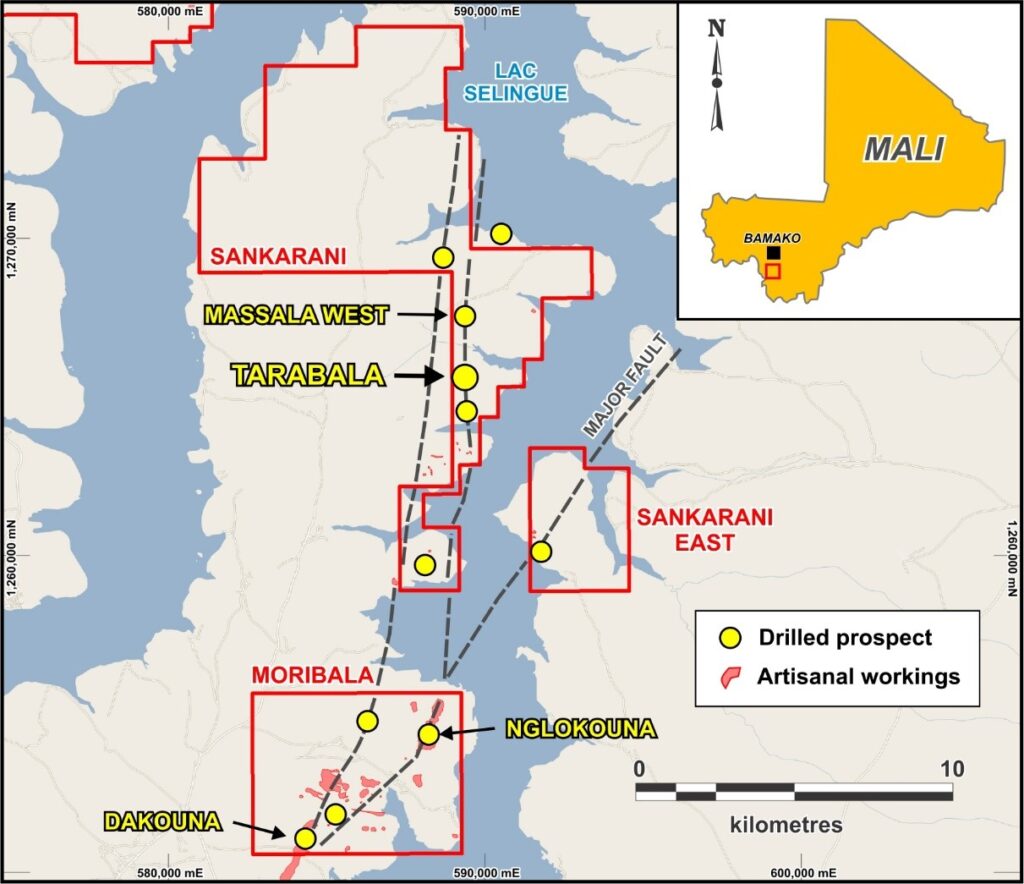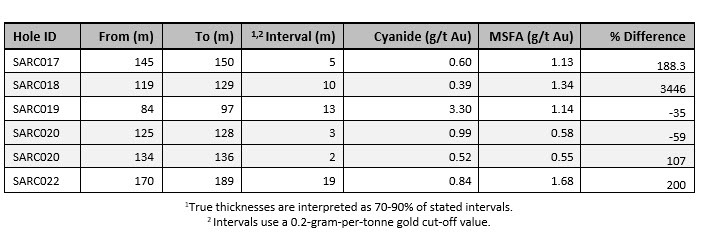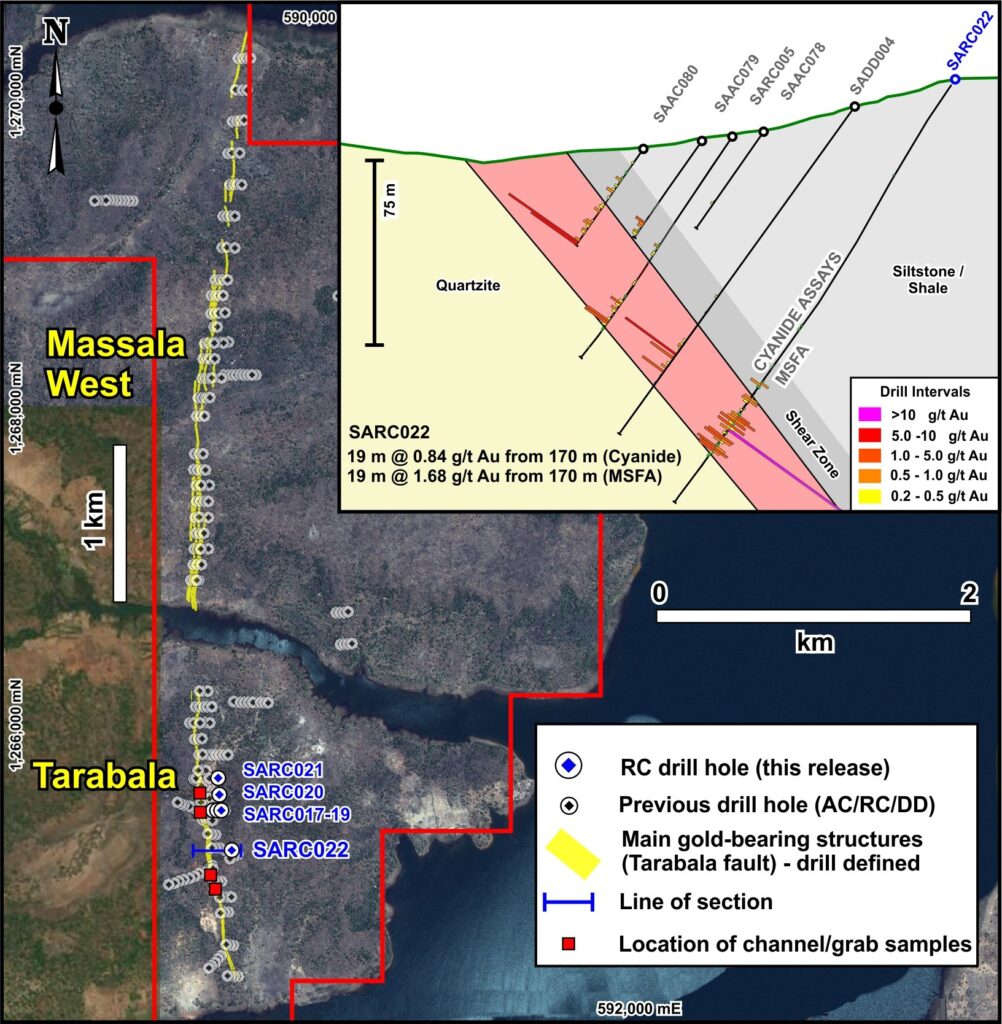Investigating Potential to Commence Small Oxide Mining Operations
Toronto, Ontario, May 3, 2023 – Compass Gold Corp. (TSX-V: CVB) (Compass or the Company) is pleased to provide an update on additional assay data on recently completed deep reverse circulation drilling, and surface channel and grab sampling at the Tarabala prospect, located on the Company’s Sikasso Property in Southern Mali (Figure 1).
Highlights
- Coarse-grained “nuggety” gold is confirmed at Tarabala, and likely present at other locations along the Tarabala Trend
- Best interval with increased gold: 19 m at 1.68 g/t Au (from 170 m), compared to 0.84 g/t Au from cyanide extraction (an increase of 200%)
- Nuggety gold shown to occur in fresh rock at depth, and not solely in the near-surface weathered laterite
- Metallic screen fire and cyanide extraction assay results are in good overall agreement
- Reconfirms that mineralization remains open at depth and along strike
- The Company is considering the development of a small mining operation on high-grade near-surface gold mineralization to generate a near-term revenue stream.
Compass CEO, Larry Phillips, said,“While our primary goal has always been to discover a large, open-pittable gold deposit in Mali, our technical team has successfully identified several exciting wide, near-surface mineralized trends typically containing gold grades of about 1 g/t Au. These are outstanding results, as many of the largest mines in West Africa are producing gold at grades of between 0.75 and 1.1 g/t Au. In fact, the drilling and assaying we have recently completed on our Tarabala prospect have clearly demonstrated the potential to develop one or more small, near-surface mines which could generate ongoing revenue to fund the exploration work required to develop a far larger, open-pittable gold resource.”
Dr. Madani Diallo, Director and Country Manager, added, “During our ongoing quest to uncover an open-pitiable, high-grade gold deposit, we have completed 20,000 m of drilling and intercepted several large sections of lower-grade mineralization along the 20 km long Massala-Tarabala-Moribala trends. We are excited about working to define open pittable low-grade gold resources that are easy to mine and process with an appropriate plant as done elsewhere in the region, such as AngloGold Ashanti’s Siguri mine in Guinea, which has been mining gold from a series of 18 pits at average grades of less than 1 g/t Au since 2008. Such operations are particularly attractive at a time when the gold price is approaching US$2,000/oz.”
Dr. Sandy Archibald, PGeo, Technical Director, added, “Our latest results are extremely encouraging and continue to validate our view that, due to the presence of nuggety gold along our mineralized trends, conventional fire assaying has very likely under-reported gold grades within the main target zones like Tarabala. We look forward to further testing the open structure along strike and down dip.”
Next Steps
Compass plans to collect and test a series of large (10-15 kg) channel samples from existing surface workings at the Tarabala prospect to test gold recoveries from the near-surface zone. If results are positive, additional channel samples will be collected at prospects along the Tarabala and Moribala trends.
The Company is also finalizing plans for a deep trenching and pitting program at the main Tarabala prospect to develop the optimal scenario for mining gold from the near-surface laterite. This program will involve the excavation of five 5-m deep, and 100-m long trenches, and the collection and analysis of the recovered 1 m channel samples. In addition, a series of 5 m deep pits will be dug every 20 m between the trenches and the channels sampled and analysed for gold.
Figure 1: Location of drilled prospects and artisanal workings along the Tarabala and Massala faults.
Recent Tarabala Drilling Results
Six RC drill holes (1,036 m) were drilled in early March at the Tarabala prospect to test the down-dip extension of mineralization previously identified by near-surface drilling (Figure 1). The 1-m sample intervals were analysed for gold using cyanide-leach (LeachWELL) analysis and the results reported in a Compass press release on April 18, 2023. The analysis identified a wide zone of gold mineralization (greater than 10 m) in five of the six holes (Table 1). The widest intercept was 19 m @ 0.84 g/t Au (from 170 m, SARC022), and the highest grade was 13 m @ 3.30 g/t Au (from 84 m, SARC019), which included a 1 m @ 18.90 g/t Au (from 86 m). The presence of high-grade gold samples in fresh rock is indicative of coarse-grained (“nuggety”) gold. To investigate the presence of nuggety gold, duplicate sample intervals were analysed using the Metallic Screen Fire Assay (MSFA) technique, which uses different crushed and sieved fractions to determine the presence of coarse-grained gold. The results of the Metallic Screens are tabulated in Table 1.
Table 1. Comparison of Cyanide extraction and Metallic Screen Fire Assay of mineralized intervals identified during recent RC drilling at the Tarabala prospect.
The greatest increase in grade was present in SARC018 where 10 m @ 0.39 g/t Au (cyanide) became 10 m @ 1. 34 g/t Au (MSFA), a 344% increase. The widest drilled intercept was encountered in SARC022, where 19 m @ 0.84 g/t Au (from 170 m, SARC022), (cyanide) increased to 19 m @ 1.68 g/t Au (from 170 m, SARC022), (MSFA), which doubles the grade of the interval. Increases were also seen in intervals in SARC017 and part of a narrower interval in SARC022. The largest decrease was present in SARC019, where 13 m @ 3.30 g/t Au (from 84 m), was reduced in grade to 13 m @ 1.14 g/t Au (from 170 m, SARC022). This reduction is expected since the nature of coarse gold means the variability (heterogeneity) is likely to be high even in duplicate samples from the same interval. What is promising about this sample interval is that the MSFA showed gold was still above 1 g/t Au in the bedrock.
Important takeaways from the work are: coarse gold is present in bedrock samples, grades are generally higher in the MSFA samples, and grades in the widest intervals are greater than 1 g/t Au.
Figure 2: Summary map of drilling on the Tarabala Trend and the location of the recently completed RC drill holes. The cross-section shows both down-hole cyanide leach and MSFA results for SARC022.
Tarabala Channel Sampling Results
A total of twenty-two, 5 kg surface samples (12 channel and 10 quartz vein grab) were collected from four areas over a strike length of 600 m of artisanal workings at Tarabala in March 2023. The samples were analysed for gold using cyanide leach extraction (“cyanide”) and metallic screen fire assaying (MSFA). The aim of the sampling was to compare assaying techniques for surface samples, and determine if the samples displayed coarse gold. The channel samples collected from artisanal workings on the surface projection of mineralization from SARC017-19 contained 8 m @ 1.72 g/t Au (cyanide leach) and 8 m @ 1.08 g/t Au (MSFA). Due to safety considerations, it was not possible to sample the complete 12 m mineralized zone. The highest-grade sample analysed by cyanide leaching contained 9.83 g/t Au, whereas the same sample analysed by MSFA contained 3.71 g/t Au. The average grade of the zone, excluding the high-grade interval, was 7 m @ 0.56 g/t Au (cyanide) and 7 m @ 0.71 g/t Au (MSFA).
Four samples collected 80 m north of the channel samples on the main north-south veins system averaged 0.58 g/t Au (cyanide) and 0.50 g/ Au (MSFA). Two samples collected to test east-west cross-cutting veins contained 0.10 g/t Au (cyanide) and 0.09 g/t Au (MSFA).
Two samples of mineralization sampled 450 m south of the channel sample location averaged 0.78 g/t Au (cyanide) and 0.56 g/t Au (MSFA). The final samples collected were an additional 50 m to the south, with the highest grade recorded being 5.38 g/t Au (cyanide) and 7.35 g/t Au (MSFA). The sampling locations are close to where an air core drill hole intercepted 5 m @ 2.86 g/t Au (from 8 m, SAAC083) in December 2020.
Statistical analysis of the surface and drilling cyanide versus MSFA assay results showed that coarse gold was slightly more abundant in surficial samples (one in four, or 25%), compared to one-in-six (17%) of the bedrock samples.
Technical Details
All six RC holes at the Tarabala prospect were drilled at dips of 55°, with azimuths of 270° (towards the west). Hole lengths varied from 115 to 200 m, for a total depth of 1,036 m. Drilling was performed by FTE Drilling, a Canadian company with a Malian subsidiary based in Bamako. All samples were prepared by Compass staff, and an appropriate number of standards, duplicates and blanks were submitted and analysed for gold using cyanide-leach (LeachWELL) analysis at ALS (Ouagadougou, Burkina Faso), and follow-up metallic screen fire assay at SGS (Bamako, Mali).
AngloGold Ashanti’s Siguri mine has been in production since 2008, with the ore being exploited from 18 pits. As of 2019, the total ore reserves in the Proven and Probable category at Siguiri were estimated to be 72.33 Mt graded 0.76 g/t Au, containing 1.76 Moz of gold. The mineral resources (Measured, Indicated and Inferred) stood at 185.6 Mt with a grade of 0.95 g/t Au, and a total contained gold of 5.7 Moz. Production details are from the AngloGold Ashanti website and annual report.
About Compass Gold Corp.
Compass, a public company having been incorporated into Ontario, is a Tier 2 issuer on the TSX- V. Through the 2017 acquisition of MGE and Malian subsidiaries, Compass holds gold exploration permits located in Mali that comprise the Sikasso Property. The exploration permits are located in three sites in southern Mali with a combined land holding of 1,173 sq. km. The Sikasso Property is located in the same region as several multi-million-ounce gold projects, including Morila, Syama, Kalana and Komana. The Company’s Mali-based technical team, led in the field by Dr. Madani Diallo and under the supervision of Dr. Sandy Archibald, P.Geo, is conducting the current exploration program. They are examining numerous anomalies first noted in Dr. Archibald’s August 2017 “National Instrument 43-101 Technical Report on the Sikasso Property, Southern Mali.”
Qualified Person
This news release has been reviewed and approved by EurGeol. Dr. Sandy Archibald, P.Geo, Compass’s Technical Director, the Qualified Person for the technical information in this news release under National Instrument 43-101 standards.
Forward‐Looking Information
This news release contains “forward‐looking information” within the meaning of applicable securities laws, including statements regarding the Company’s planned exploration work and management appointments. Readers are cautioned not to place undue reliance on forward‐looking information. Actual results and developments may differ materially from those contemplated by such information. The statements in this news release are made as of the date hereof. The Company undertakes no obligation to update forward‐looking information except as required by applicable law.
For further information please contact:
| Compass Gold Corporation | Compass Gold Corporation |
| Larry Phillips – Pres. & CEO | Greg Taylor – Dir. Investor Relations & Corporate Communications |
| lphillips@compassgoldcorp.com | gtaylor@compassgoldcorp.com |
| T: +1 416-596-0996 X 302 | T: +1 416-596-0996 X 301 |
Website: www.compassgoldcorp.com
NEITHER THE TSX VENTURE EXCHANGE NOR ITS REGULATION SERVICES PROVIDER (AS THAT TERM IS DEFINED IN THE POLICIES OF THE TSX VENTURE EXCHANGE) ACCEPTS RESPONSIBILITY FOR THE ADEQUACY OR ACCURACY OF THIS RELEASE



